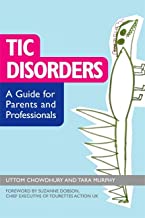Tic Disorders
Resources for Patients and Caregivers
Tics are sudden twitches, movements, or sounds that people do repeatedly. People who have tics cannot stop their body from doing these things. For example, a person with a motor tic might keep blinking over and over again. Or, a person with a vocal tic might make a grunting sound unwillingly.
Cluster Number:
Wiki Number: 54-Tic Disorders
Diagnosis: categorized by type (motor or phonic) and duration (sudden, rapid, nonrhythmic movements)
US Patients:
World Patients: 1% usually before puberty
Sex Ratio:
Age Onset: 20% of children experience tics between ages 5 and12.
Brain Area:
Symptoms: Tourette’s Syndrome is the most widely known and is chronic.
Progression:
Causes: May be caused by medications or illicit drugs.
Medications:
Therapies:
Youtube Video: Children and Tics
Youtube Video:
Tics, Stress and Mental Health
Amazon or Library Book: Tic Disorders
Click the book to link or order from Amazon.

